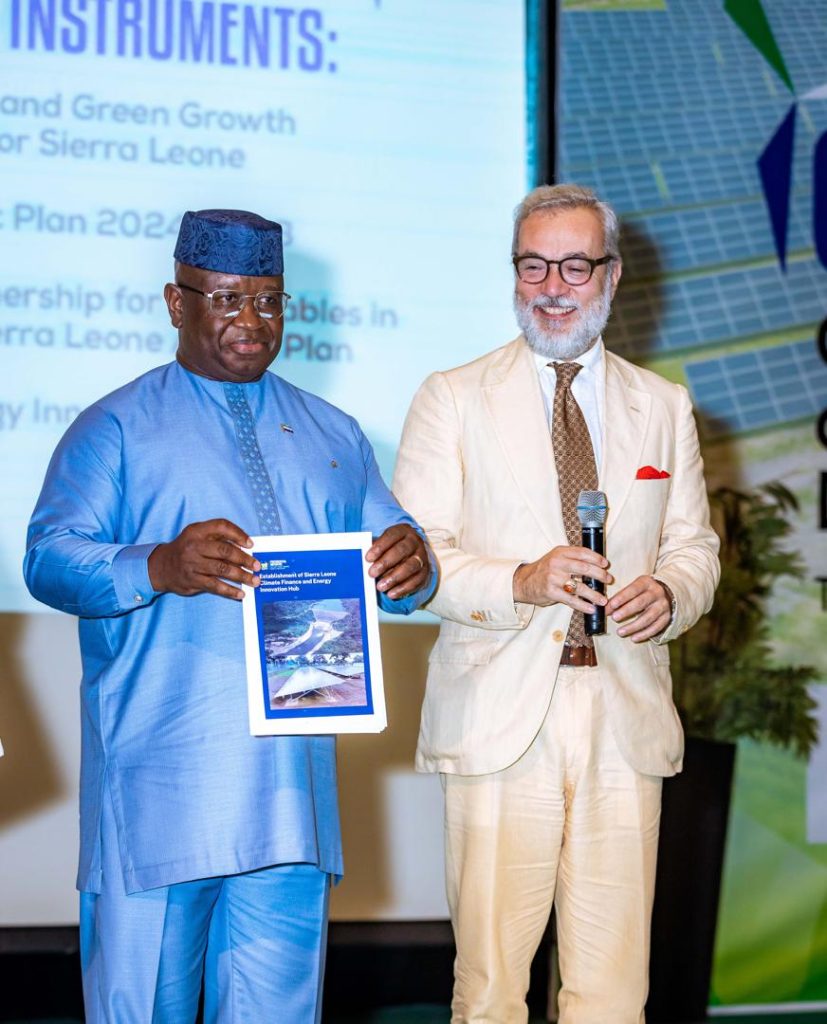By Yusufu S. Bangura

On November 4, 2024, international partners and companies gathered at the Bintumani International Conference Centre in Freetown for the two-day National Dialogue on Climate Resilience and Energy Transition. They pledged new commitments to support Sierra Leone’s energy sector, addressing critical areas including renewable energy, climate finance, and off-grid solutions.
The dialogue, themed “From Commitment to Action,” was organized by the Presidential Initiative on Climate Change, Renewable Energy, and Food Security (PI-CREF) and jointly chaired by Vice President Dr. Mohamed Juldeh Jalloh and Dr. Kandeh Yumkella, Chairman of the Presidential Initiative.
The event saw development partners discuss long-term energy investments, modern energy access, off-grid solutions, and climate resilience. Key partners reaffirmed their commitments, highlighting various ongoing and future projects.
U.S. Ambassador to Sierra Leone, David Bryan Hunt reiterated the U.S. commitment to the MCC Compact and the Western Area Power Project, emphasizing the significance of these projects for Sierra Leone’s energy goals.
The Global Electric Cooking Coalition (GeCCo) announced a $5 million E-Cooking Initiative aimed at promoting clean cooking solutions, reducing firewood usage, and improving health outcomes.
UNDP Country Representative, Frederick Appiah reaffirmed the UNDP’s support for Sierra Leone’s Climate Resilience and Energy Transition, ensuring technical assistance and financial backing.
United Kingdom High Commissioner, Josephine Gauld noted the UK’s ongoing work with the Electricity Distribution and Supply Authority (EDSA) to enhance operational efficiency and revenue collection.
German Ambassador, Jens Krauss-Masse committed Germany’s support for Sierra Leone’s climate finance strategy and renewable energy development through the Accelerated Partnership for Renewables in Africa (APRA).
Irish Ambassador, Aidan Fitzpatrick shared Ireland’s progress in electrifying five communities and plans to expand coverage across Kambia District by 2025, with the goal of eventually lighting up the entire country.
World Bank Country Manager, Dr. Andy Mwonge pledged the bank’s efforts to advance clean energy, promising that Sierra Leone will participate in the AM300 clean energy program.
IRENA/APRA Representative emphasized IRENA’s readiness to provide technical expertise and assist with the development of the Bumbuna and Dodo hydro projects.
In his address, President Julius Maada Bio thanked development partners for their support of Sierra Leone’s energy transition plan, describing it as a critical step in addressing climate change and strengthening the national energy system.
He highlighted the need for sustainable energy solutions to boost food security and economic livelihoods, stressing that the shift to renewable energy aligns with Sierra Leone’s climate commitments.
“Our response to climate change cannot be separated from issues of energy access, food security, and economic livelihoods. Transitioning to renewable energy and sustainable agriculture is key to tackling these challenges,” said President Bio.
He emphasized his vision for a low-carbon economy, universal electricity access, and reduced reliance on imported heavy fuel oil.
Deputy Minister of Energy 1, Dr. Eldred Taylor, called the energy sector the backbone of the economy but acknowledged ongoing infrastructure challenges that hinder reliable access to electricity.
He detailed recent investments, including the MCC Compact, World Bank’s support to EDSA, and the enactment of the EWRC Act.
Vice President Dr. Mohamed Juldeh Jalloh closed the event by underscoring the essential role of energy as a driver of sustainable development. “Energy is more than an enabler; it’s the primary vehicle for sustainable development,” he remarked.
The dialogue concluded with the launch of the PI-CREF strategic plan, the unveiling of the Just Energy Transition and Green Growth (JET-P) Investment Plan, and the establishment of a Climate Finance and Energy Innovation Hub.
The ambition includes increasing grid capacity from 240 MW to 1 GW in the next decade and expanding mini-grid installations to support agricultural and mining sectors.
This year’s dialogue reflects Sierra Leone’s growing commitment to a sustainable energy future, with both local leaders and global partners working to achieve a resilient and inclusive energy sector.


